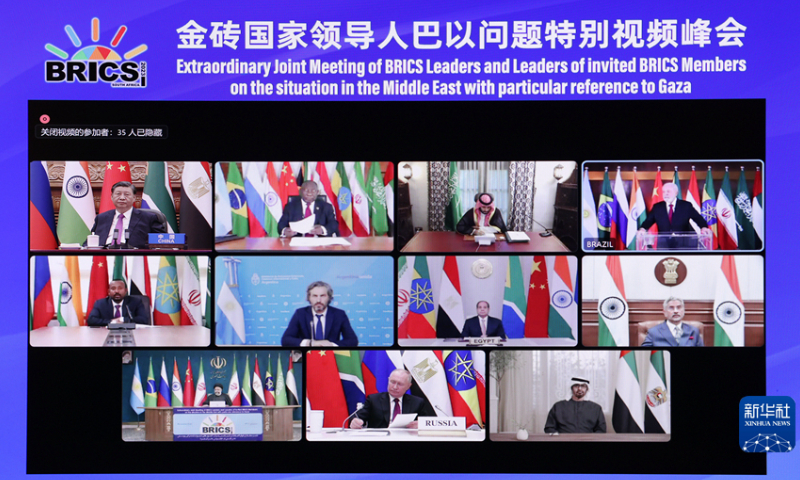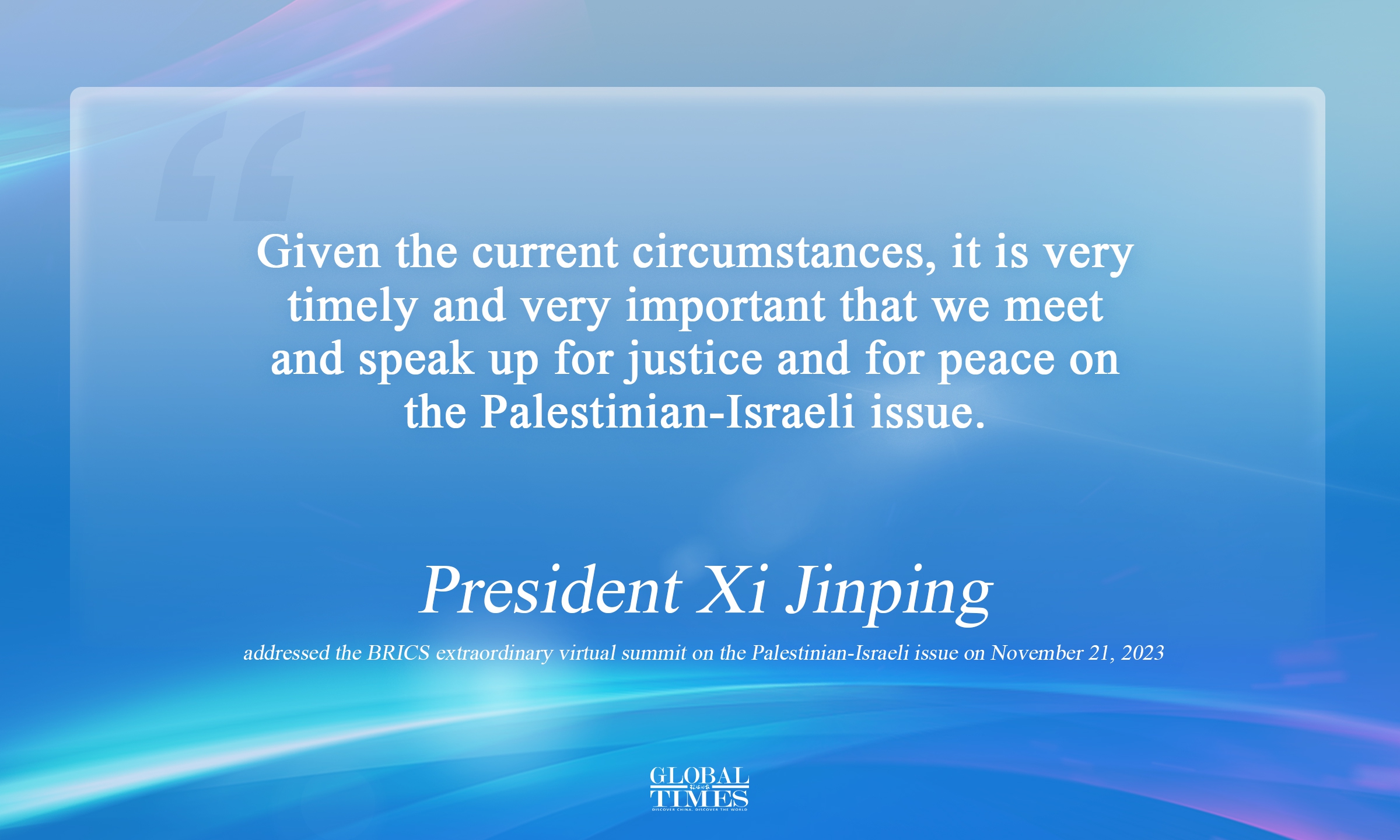To ease Palestinian-Israeli conflict, world should heed BRICS' voice: Global Times editorial

Photo: Xinhua
The extraordinary video summit on the Palestinian-Israeli issue held by the BRICS leaders on November 21 is the first-ever emergency conference dedicated to an unforeseen international issue in the history of the BRICS. It is also the first leaders' meeting of BRICS since its expansion in August of this year. As the most prestigious and influential cooperation platform for emerging-market countries and developing countries, BRICS holding a special summit at this critical juncture of the Palestinian-Israeli conflict marks a good start for greater BRICS cooperation. As Chinese President Xi Jinping stated, it is very timely and very important that the BRICS countries meet and speak up for justice and for peace on the Palestinian-Israeli issue.
At the invitation of South African President Cyril Ramaphosa, President Xi Jinping attended the summit and delivered an important speech entitled "Working Toward a Ceasefire and Realizing Lasting Peace and Sustainable Security." He proposed three "urgent tasks." First, the parties to the conflict must end hostilities and achieve a cease-fire immediately, stop all violence and attacks against civilians, release civilians held captive, and act to prevent loss of more lives and spare people from more miseries. Second, humanitarian corridors must be kept secure and unimpeded, and more humanitarian assistance should be provided to the population in Gaza. The collective punishment of people in Gaza in the form of forced transfer or water, electricity and fuel deprivation must stop. Third, the international community must act with practical measures to prevent the conflict from spilling over and endangering stability in the Middle East as a whole. These three "urgent tasks" address the core issues, are highly practical and sincere, and possess a high degree of constructiveness and operability.
President Xi emphasized that the only viable way to break the cycle of Palestinian-Israeli conflict lies in the two-state solution and he called for the early convening of an international peace conference that is more authoritative. These proposals align with the expectations of regional countries and articulate the broad consensus of the BRICS and the international community. Other participating leaders also delivered speeches, issuing "BRICS strong voices" on the Palestinian-Israeli issue, which are not negligible.
The BRICS mechanism, for the first time, held a special summit on regional hot-spot conflicts, signifying the arrival of a powerful ally for the global governance system that is being confronted with numerous challenges and difficulties. UN Secretary-General Antonio Guterres attended the meeting, representing the international community's expectations for the BRICS countries to play a greater role in addressing hot spot issues.
The Palestinian-Israeli conflict is a mirror that reflects many things. Because of the opposition of a few countries, the UN Security Council was unable to take firm actions, which has become an insurmountable obstacle that the UN Security Council cannot overcome. Some other Western countries lack the willingness and courage to stand up for justice, thus leading to a vacuum in the global governance system. The BRICS countries, which represent the emerging-market countries and developing countries, have come forward to fill the vacuum. This underscores the further expansion of the functions of the BRICS cooperation mechanism, the enhancement of its influence in the international community, the power of BRICS countries in shaping the international landscape, as well as its profound impact on the world's development process.
From the outbreak of the latest round of the Palestinian-Israeli conflict to the convening of this virtual meeting, China, Russia, Brazil, South Africa and other BRICS members have made efforts to promote a cease-fire in Gaza and prevent the escalation of violence by submitting bills and organizing meetings within the framework of the UN Security Council. In this process, the stance of BRICS members is unanimous: They are committed to promoting talks for peace, opposing violence and avoiding humanitarian disasters, which is clearly different from that of some Western countries. BRICS is becoming a symbol and an entity that upholds international justice, and the more influence it has in the international arena, the better it will be for peace and tranquility in the world.
The serious marginalization of the Palestinian issue in recent years is one of the root causes of this round of Palestinian-Israeli conflict, and the BRICS countries' special approach to highlighting their concern for the Palestinian issue will help to promote the international community's prioritization of this issue on the international agenda and to create the conditions for a comprehensive and just settlement. We hope that the Western countries and the BRICS countries will work together to cool down the Palestinian-Israeli situation and make concrete efforts for peace and development.


